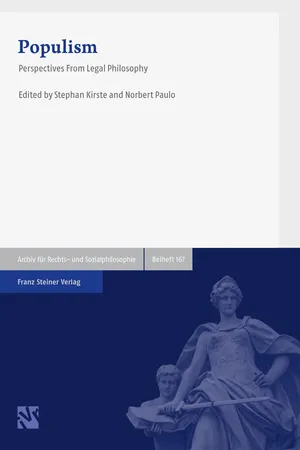
- 338 pages
- English
- PDF
- Available on iOS & Android
About this book
The recent advent of right-wing populism poses a challenge to the rule of law, democracy and liberal values such as freedom, equality and tolerance. Naturally, this led to an intense academic discussion. However, the majority of relevant publications looks at populism from the point of view of political theory. Philosophers and legal scholars have largely remained bystanders in this debate. This volume analyzes the populist challenges from the perspective of legal philosophy. It focusses on liberal democratic values, structures and procedures. It complements the populism debate in political theory by emphasizing the normative challenges of populism and the responses it warrants. As the contributions to this volume show, populism is not only directed against the formal structures of democratic constitutional states, but also undermines their informal elements such as the political culture, democratic ethos, truthfulness, and other elements necessary for the realization of the rule of law. The contributions discuss means to meet the populist challenges, including the revival of the political as well as a critical and reflected liberalism. These analyses are then illustrated by case studies of the particular populisms in Italy, Brazil and Turkey.
Frequently asked questions
- Essential is ideal for learners and professionals who enjoy exploring a wide range of subjects. Access the Essential Library with 800,000+ trusted titles and best-sellers across business, personal growth, and the humanities. Includes unlimited reading time and Standard Read Aloud voice.
- Complete: Perfect for advanced learners and researchers needing full, unrestricted access. Unlock 1.4M+ books across hundreds of subjects, including academic and specialized titles. The Complete Plan also includes advanced features like Premium Read Aloud and Research Assistant.
Please note we cannot support devices running on iOS 13 and Android 7 or earlier. Learn more about using the app.
Information
Table of contents
- Content
- Introduction (STEPHAN KIRSTE / NORBERT PAULO)
- Part I: Foundations
- Part II: Populism and the Political
- Part III: Case Studies: Populism in Italy and Brazil
- Part IV: Epistemic Issues